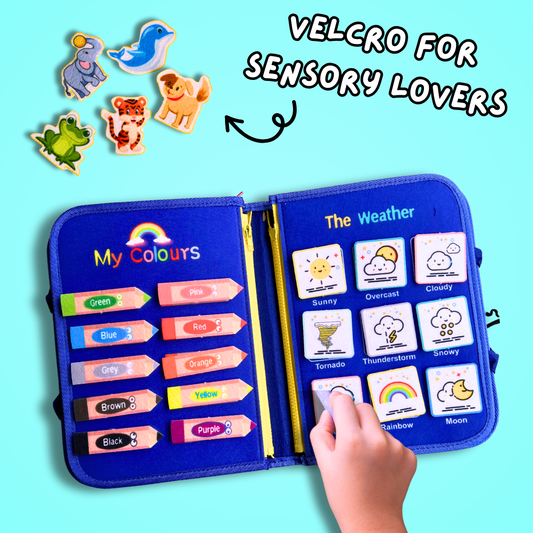
The Golden Years: 0-5
Share
The first five years of a child’s life are often referred to as the golden years of development, and for good reason. During this time, the brain undergoes rapid growth, forming connections that will shape the child’s future learning, behaviour, and overall ability to navigate the world. It is during these crucial years that the foundations for cognitive abilities, language, motor skills, and social-emotional development are built. Research increasingly supports the idea that early childhood is a critical period for brain development, and providing children with opportunities to practice and refine skills during this time can have a profound impact on their success later in life—both in school and in the workplace.
In this blog, we’ll explore why the ages 0-5 are so vital, how specific skills like brain development, language, and motor abilities are formed, and how early practice of these skills can set children up for success throughout their lives.
The Importance of Brain Development in the First 5 Years
The first few years of life are a time of unparalleled brain development. Between birth and age 5, a child’s brain forms more than 1 million new neural connections every second, a process known as neuroplasticity. These early experiences shape the wiring of the brain, influencing everything from memory and problem-solving to emotional regulation and language acquisition.
Research has shown that early childhood experiences have a significant impact on the structure and function of the brain. According to the National Scientific Council on the Developing Child (2007), brain architecture is built over time through a series of interactions with caregivers, environments, and experiences. During the first few years, the brain is highly responsive to stimuli and, as such, is particularly vulnerable to both positive and negative influences. This is why early intervention and providing children with the right kinds of experiences can lead to long-term benefits for their cognitive, emotional, and physical health.
In the early years, children begin to develop foundational cognitive skills that serve as the bedrock for more complex thinking later in life. These include attention span, working memory, and problem-solving abilities. A study by Shonkoff and Phillips (2000) highlights that providing children with stimulating environments—whether through reading books, playing interactive games, or engaging in creative activities—strengthens the brain’s neural pathways and primes them for academic success.
Building Language Skills: The Cornerstone of Communication and Learning
One of the most significant developmental milestones during the early years is the development of language. From the moment a baby is born, their brain is primed to acquire language. Research has shown that the foundation for language development is laid by the age of 3, with critical developments happening between 0 and 5. During this period, babies and toddlers learn to recognize sounds, words, and later, grammar, while also developing the social skills required for effective communication.
Studies consistently show that a child’s vocabulary size by age 3 is one of the most important predictors of later academic success. A well-known study by Hart and Risley (1995) found that children from higher-income families were exposed to more words during their early years, which contributed to their larger vocabulary and higher academic achievement later in life. Conversely, children who had less verbal interaction in the early years were more likely to struggle with language and literacy skills in school.
Importantly, language development during the first five years is not just about learning words. It’s about acquiring the cognitive tools necessary to think, understand, and interact with the world. For instance, research by Zimmerman et al. (2009) indicates that children who are read to regularly during their early years are more likely to have a larger vocabulary, stronger listening skills, and better reading comprehension as they enter school. Language skills are foundational for success in all areas of life, from school to the workplace. The ability to communicate effectively with peers, teachers, and later colleagues, is a skill that sets children up for future success in both personal and professional environments.
Developing Motor Abilities: The Building Blocks for Physical and Cognitive Growth
Motor development, including both fine and gross motor skills, is another critical area of growth during the early years. These skills are foundational not only for a child’s physical health but also for their cognitive development and later academic success. Gross motor skills, such as crawling, walking, and running, provide the physical coordination and strength that are necessary for everyday activities, while fine motor skills—such as drawing, writing, and using utensils—are crucial for academic tasks like writing and manipulating objects in a classroom setting.
According to a study by Pica (2015), there is a strong link between physical activity and cognitive development in early childhood. Children who are physically active, engage in activities that promote balance, coordination, and spatial awareness, and practice their fine motor skills, show improvements in their attention span, problem-solving abilities, and memory. Additionally, children who develop good motor skills early on tend to perform better in school, especially in subjects that require hand-eye coordination, like math and science.
As children develop these motor skills, they also improve their social-emotional capabilities. Learning to share a ball, take turns, or engage in a cooperative game can foster social interaction skills that are essential for both school and life. Studies, such as one conducted by Pesce et al. (2016), highlight how physical play and motor activities enhance brain function by increasing blood flow to the brain, improving memory, and enhancing cognitive abilities.
The Impact of Practicing Early Skills on Future Success
While the first five years are foundational for a child’s growth, it’s important to remember that learning during this time doesn't stop once they reach school age. The skills children practice early on—whether cognitive, language, or motor—are the building blocks for future success in the classroom, the workplace, and life in general.
Research supports the notion that early developmental skills significantly impact later academic and social performance. For example, a longitudinal study by Duncan et al. (2007) found that children who had strong early language skills and cognitive abilities were more likely to perform well in reading and math in later years, and had a higher likelihood of completing high school and going to college.
Moreover, the motor skills and social behaviours developed in the first five years are just as important for later success. Children who engage in regular physical activity and cooperative play early in life have better attention spans, are more likely to exhibit positive social behaviours, and tend to perform better in school (Pesce et al., 2016). These skills also translate into professional life, where teamwork, communication, and problem-solving abilities are essential for success in the workplace.
Conclusion: Early Investment Pays Dividends
The first five years of life represent a critical period for laying the groundwork for future learning and development. During these golden years, the brain is forming connections at an incredible rate, and the skills that children develop in language, motor abilities, and cognitive processing set the stage for academic success and well-being in later life.
Research consistently supports the importance of early intervention and practice in promoting brain growth, language acquisition, and motor development. By providing children with opportunities to practice and refine these skills, parents and caregivers are giving them the tools they need to succeed not only in school but in life.
As children grow older, the skills they practiced during their early years will help them navigate the complexities of school, work, and relationships. Investing in the first five years is an investment in a child's future success, laying the foundation for a lifetime of learning, achievement, and fulfilment.
In this blog, we’ll explore why the ages 0-5 are so vital, how specific skills like brain development, language, and motor abilities are formed, and how early practice of these skills can set children up for success throughout their lives.
The Importance of Brain Development in the First 5 Years
The first few years of life are a time of unparalleled brain development. Between birth and age 5, a child’s brain forms more than 1 million new neural connections every second, a process known as neuroplasticity. These early experiences shape the wiring of the brain, influencing everything from memory and problem-solving to emotional regulation and language acquisition.
Research has shown that early childhood experiences have a significant impact on the structure and function of the brain. According to the National Scientific Council on the Developing Child (2007), brain architecture is built over time through a series of interactions with caregivers, environments, and experiences. During the first few years, the brain is highly responsive to stimuli and, as such, is particularly vulnerable to both positive and negative influences. This is why early intervention and providing children with the right kinds of experiences can lead to long-term benefits for their cognitive, emotional, and physical health.
In the early years, children begin to develop foundational cognitive skills that serve as the bedrock for more complex thinking later in life. These include attention span, working memory, and problem-solving abilities. A study by Shonkoff and Phillips (2000) highlights that providing children with stimulating environments—whether through reading books, playing interactive games, or engaging in creative activities—strengthens the brain’s neural pathways and primes them for academic success.
Building Language Skills: The Cornerstone of Communication and Learning
One of the most significant developmental milestones during the early years is the development of language. From the moment a baby is born, their brain is primed to acquire language. Research has shown that the foundation for language development is laid by the age of 3, with critical developments happening between 0 and 5. During this period, babies and toddlers learn to recognize sounds, words, and later, grammar, while also developing the social skills required for effective communication.
Studies consistently show that a child’s vocabulary size by age 3 is one of the most important predictors of later academic success. A well-known study by Hart and Risley (1995) found that children from higher-income families were exposed to more words during their early years, which contributed to their larger vocabulary and higher academic achievement later in life. Conversely, children who had less verbal interaction in the early years were more likely to struggle with language and literacy skills in school.
Importantly, language development during the first five years is not just about learning words. It’s about acquiring the cognitive tools necessary to think, understand, and interact with the world. For instance, research by Zimmerman et al. (2009) indicates that children who are read to regularly during their early years are more likely to have a larger vocabulary, stronger listening skills, and better reading comprehension as they enter school. Language skills are foundational for success in all areas of life, from school to the workplace. The ability to communicate effectively with peers, teachers, and later colleagues, is a skill that sets children up for future success in both personal and professional environments.
Developing Motor Abilities: The Building Blocks for Physical and Cognitive Growth
Motor development, including both fine and gross motor skills, is another critical area of growth during the early years. These skills are foundational not only for a child’s physical health but also for their cognitive development and later academic success. Gross motor skills, such as crawling, walking, and running, provide the physical coordination and strength that are necessary for everyday activities, while fine motor skills—such as drawing, writing, and using utensils—are crucial for academic tasks like writing and manipulating objects in a classroom setting.
According to a study by Pica (2015), there is a strong link between physical activity and cognitive development in early childhood. Children who are physically active, engage in activities that promote balance, coordination, and spatial awareness, and practice their fine motor skills, show improvements in their attention span, problem-solving abilities, and memory. Additionally, children who develop good motor skills early on tend to perform better in school, especially in subjects that require hand-eye coordination, like math and science.
As children develop these motor skills, they also improve their social-emotional capabilities. Learning to share a ball, take turns, or engage in a cooperative game can foster social interaction skills that are essential for both school and life. Studies, such as one conducted by Pesce et al. (2016), highlight how physical play and motor activities enhance brain function by increasing blood flow to the brain, improving memory, and enhancing cognitive abilities.
The Impact of Practicing Early Skills on Future Success
While the first five years are foundational for a child’s growth, it’s important to remember that learning during this time doesn't stop once they reach school age. The skills children practice early on—whether cognitive, language, or motor—are the building blocks for future success in the classroom, the workplace, and life in general.
Research supports the notion that early developmental skills significantly impact later academic and social performance. For example, a longitudinal study by Duncan et al. (2007) found that children who had strong early language skills and cognitive abilities were more likely to perform well in reading and math in later years, and had a higher likelihood of completing high school and going to college.
Moreover, the motor skills and social behaviours developed in the first five years are just as important for later success. Children who engage in regular physical activity and cooperative play early in life have better attention spans, are more likely to exhibit positive social behaviours, and tend to perform better in school (Pesce et al., 2016). These skills also translate into professional life, where teamwork, communication, and problem-solving abilities are essential for success in the workplace.
Conclusion: Early Investment Pays Dividends
The first five years of life represent a critical period for laying the groundwork for future learning and development. During these golden years, the brain is forming connections at an incredible rate, and the skills that children develop in language, motor abilities, and cognitive processing set the stage for academic success and well-being in later life.
Research consistently supports the importance of early intervention and practice in promoting brain growth, language acquisition, and motor development. By providing children with opportunities to practice and refine these skills, parents and caregivers are giving them the tools they need to succeed not only in school but in life.
As children grow older, the skills they practiced during their early years will help them navigate the complexities of school, work, and relationships. Investing in the first five years is an investment in a child's future success, laying the foundation for a lifetime of learning, achievement, and fulfilment.






